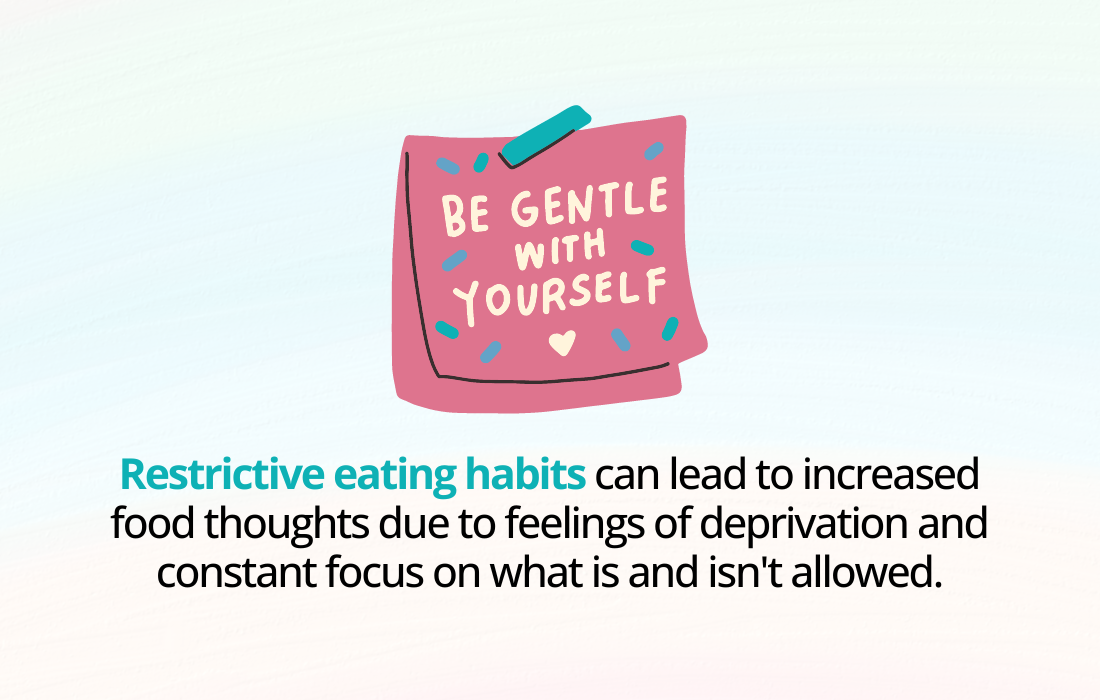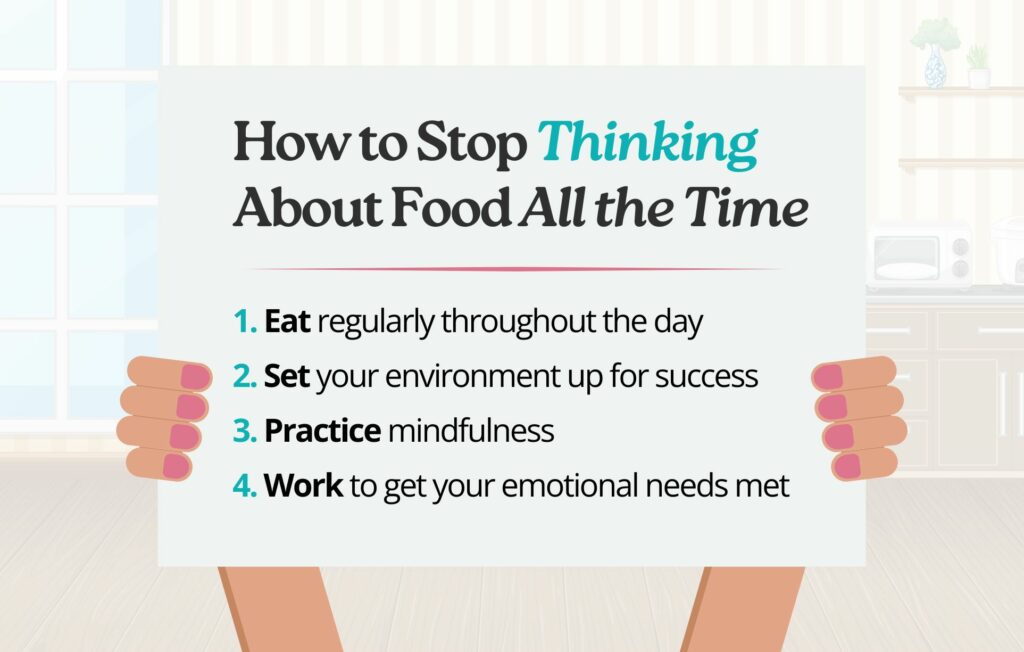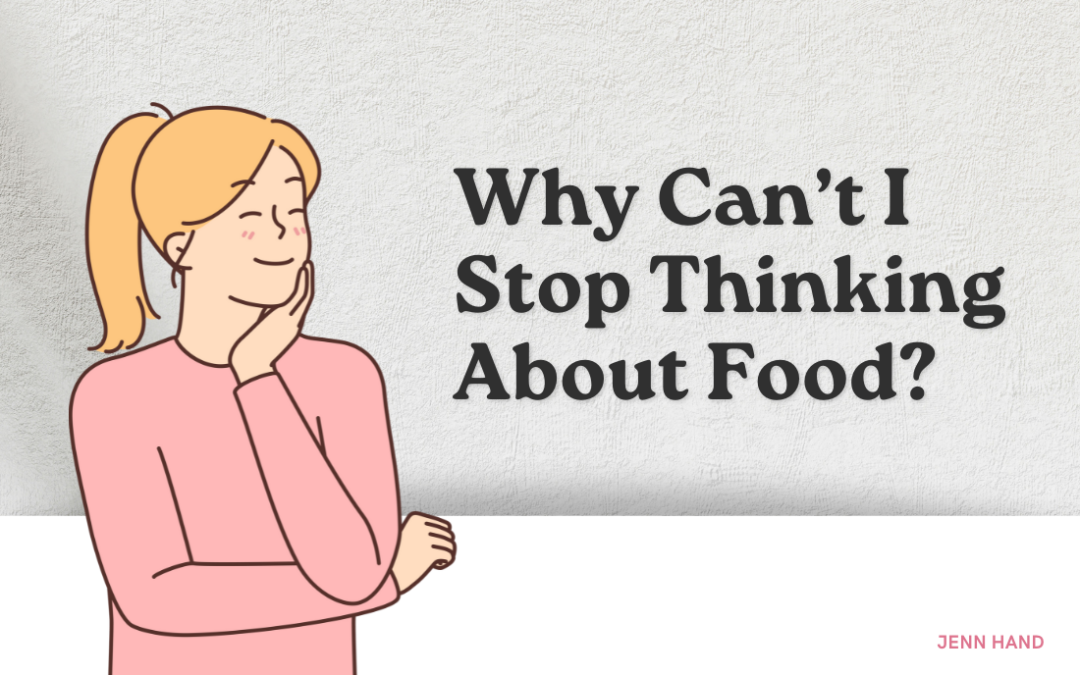I used to think about food A LOT. like 24/7.
I remember thinking that if I took all the time and energy I spent thinking about food, I’d be able to come up with a cure for a rare disease. THAT was how much it occupied my brain! Here are some of the things that helped me let go of thinking about food.
Written by Jenn Hand, Holistic Nutritionist, Board Certified Health Coach & Food Relationship Coach, NBC-HWC
5 Reasons You Can’t Stop Thinking about Food
1. Too many food rules
Being restrictive about what you can and can’t eat can lead to heightened thoughts about food due to feelings of deprivation and the constant focus on what is and isn’t allowed.
2. Emotional eating patterns
Using food as a coping mechanism for stress, boredom, or other emotions can contribute to constant thoughts about food as a way to soothe emotional discomfort.
3. Not eating enough or going too long without food
Irregular or unbalanced eating patterns, such as skipping meals or not eating enough during the day, can lead to increased hunger and subsequent preoccupation with food.
4. Environmental triggers
Surroundings filled with food cues, such as advertisements, social media, or being in the presence of food (coworkers candy dish!), can stimulate constant thoughts about eating.
5. Psychological associations
Past experiences, memories, and learned behaviors related to food can create psychological associations that trigger frequent thoughts about specific foods or eating habits.

How to Stop Thinking About Food all the Time
1. Eat regularly throughout the day
Your best bet to stop thinking about food is to make sure your body is fueled consistently during the day.
Typically the way to balanced blood sugar is eating every 3-4 hours. Use this as the general cadence of your day and tweak depending on your own preferences and lifestyle. Going too long without eating can cause cravings later in the day so be sure to keep your body fueled!
2. Set your environment up for success
I’m a big advocate of not keeping things in the house.
Explore keeping snacks and desserts to a minimum and set your living space up for a holistic, nourishing place to be.
3. Practice mindfulness
Cultivate mindfulness around eating by paying attention to hunger and fullness cues, as well as the sensory experience of eating.
This can help reduce preoccupation with food by fostering a more balanced and attuned relationship with eating. You are IN the experience of receiving the pleasure from food!
4. Work to get your emotional needs met
Explore and address the underlying emotions or triggers that contribute to thoughts about food.
Develop alternative coping strategies for managing stress, boredom, or other emotions without turning to food for comfort.

Questions:
Can being on a diet make me obsess over food?
Yes, being on a diet can lead to obsessing over food due to restrictions and feelings of deprivation.
Why do I crave sweets or junk food when I’m feeling down?
Craving sweets or junk food when feeling down may be a way of seeking comfort or temporary pleasure to escape from negative emotions.
What are the signs that my thoughts about food are unhealthy?
Signs that thoughts about food are unhealthy include constant preoccupation with food, feeling guilty or ashamed after eating, and rigid rules around eating.
Are there psychological reasons behind my food cravings?
Psychological reasons behind food cravings may include emotional triggers, such as stress or boredom, as well as learned associations from past experiences.
Can mindful eating help me control my food-related thoughts?
Mindful eating can help control food-related thoughts by promoting awareness, non-judgment, and attunement to hunger and fullness cues.
Can skipping meals lead to more food-related thoughts?
Yes, skipping meals can lead to more food-related thoughts as the body’s natural response to deprivation is increased focus on food.
How can I differentiate between physical hunger and emotional hunger?
Differentiate between physical hunger and emotional hunger by considering factors such as the timing of your last meal, the intensity of the hunger, and whether specific emotions are driving the desire to eat.
Related Articles
⚪ Why Am I Always Thinking About Food?
⚪ When You Feel Exhausted Thinking About Food
⚪ How I Stopped Binge Eating
Get the Normal Eater’s Newsletter
Join 8000+ women who are overcoming overeating, binge eating, and breaking up with dieting forever. Get Jenn’s inspiring and actionable weekly newsletter with the latest posts, podcasts, and tips on how to love your body, find food freedom, and lose weight holistically.
Get the Normal Eater’s NewsletterWork with an Emotional Eating & Holistic Nutrition Coach
Overcome Bingeing and Emotional Eating, and Break Up with Yo-yo Dieting
Working with an emotional eating coach and holistic nutritionist can help you get free from the frustrating binge and restrict cycle and stop yo-yo dieting.
You don’t have to be obsessed with food or have a million rules around eating to find your natural weight and learn to love your body. Ready to actually see a lasting change and experience true freedom?
Schedule a 20-min CallAbout the Author:

Jenn Hand has been helping women like you become normal eaters since 2015.
She’s worked with thousands of women, helping them to balance their bodies, end bingeing, stop obsessing over food, and start feeling amazing again. As a board-certified health coach, binge and emotional eating coach, and holistic nutritionist, Jenn knows how to support you in making real positive changes that last.
Her articles have been published on Mind Body Green, Tiny Buddha, Thrive Global and other local and global media platforms. She’s the author of How to Be a Normal Eater and the creator of The Normal Eater’s Club program. Listen to Jenn’s advice and tips on the Cake Doesn’t Count Podcast, or read more of her articles for free on the Food Freedom Blog.
Learn About Coaching!




